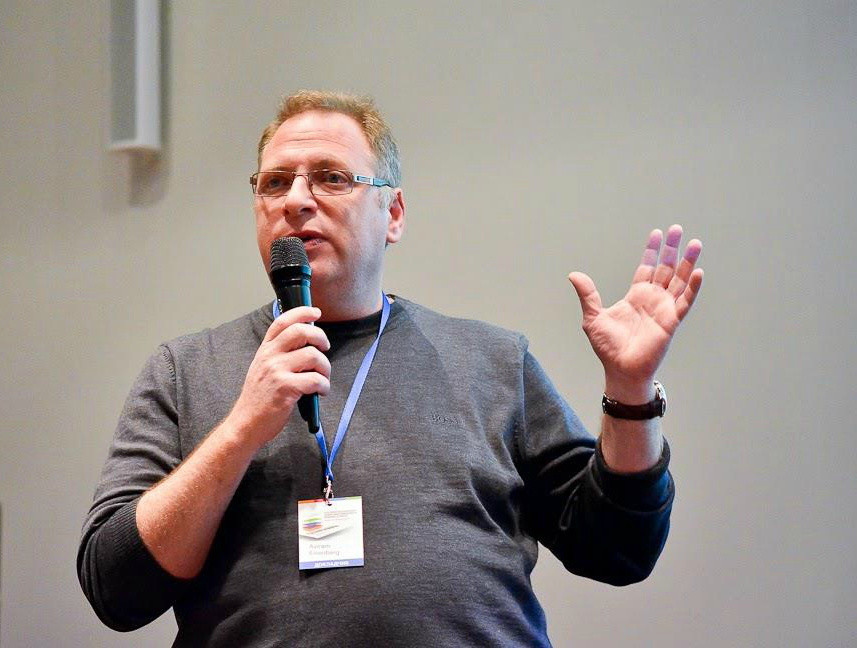“Ukraine’s well-educated, highly-skilled workforce and low labor costs provide an ideal environment for businesses to prosper”, – Silviu Popovici, General Manager of Coca-Cola.
I could not agree more with you!!!, that’s why I moved from Israel to Ukraine as soon as Maidan started (people say I’m crazy, I say: “I’m a helpless optimist). As a high-tech professional for the last 30 years, Chief Architect at Mind CTI, Founder and CEO of three High-Tech companies: Ignite, Cloudware and APPR and the Chairman of the Israeli R&D Managers Forum, I believe Ukraine has the potential to be the next startup nation!
These days, Ukraine is experiencing its worst crisis since it was born again as an independent state. Most Ukrainians see this process as a risk to the continuous existence of Ukraine as an independent country; I see it as the rebirth of Ukraine (helpless optimistic thinking, sorry). It must go through pain and sweat to be born again. One day of war costs $6 million. War has already killed part of the industrial sector in Donbass (15% of GDP), impacted energy sector (90% of coal mines are in the eastern Donbass), hit infrastructure, market and trade. Since April 2014, thousands of civilians were killed (official numbers are 6072 victims, but most probably the real numbers are much bigger) and over 1 million people left their homes and flooded the streets of Kiev as well as the neighboring regions. The local currency is in a free fall, the restaurants are empty, businesses are being shutdown at a frightening rate, new businesses are scarce and you see despair in people’s eyes wherever you go. This is a painful cost for rebirth.
From one war to another: being an Israeli living in Kiev, I can’t help comparing the most recent war in Israel to the one in Ukraine. Israel’s war in Gaza stripe costs $60 million a day and the 41-day fighting made a big hole in the state budget. Nevertheless, it doesn’t seem that Israel citizens are immigrating to find a better future for themselves abroad. I don’t see any panic coming from the foreign VC and angel investors – they keep investing their funds in new Israelis technologies. The daily living under constant possible terrorist attacks is not paralyzing Israeli economy. Why should it hit Ukrainian so hard?
In Israel, we are always talking about the High-Tech locomotive – always driving the Israeli economy forward through wars and economical crises. I see lots of similarities in the thriving Ukrainian IT sector: IT in Ukraine has created 100,000+ jobs for well-paid professionals. It was created from the scratch, prospering with zero government support. Now the Ukrainian IT sector, with its global R&D centers are in the top export categories, bringing $3 billion a year for a country, which is so low on foreign currency. The result-oriented approach of the Ukrainian engineers, their flexible mind and their hunger to succeed gained them a world-wide reputation and a constant increasing global demand for the Ukrainian brains. So, Ukraine is becoming a superpower country at IT services, but why stop here? Israel had managed to change its IT sector from selling services to a prospering High-Tech ecosystem, leveraging the Israeli brains to sell High-Tech products, not just IT services.
Israeli IT History
30 years ago Israel also was selling IT services to the USA. With time, developers left the big companies and started small innovative product companies in the same vertical. Yozma project, a government initiative, attracted VCs and the private investors in 1993. Tax incentives and double funds from government for private investments resulted in the most venture capital per capita: 2.5 times more than the U.S. and 30 times more than Europe. Today, Tel-Aviv is the second startup ecosystem in the world (more than 5,000 startups with 450-500 new ones every year). Not the least factor is extended civil legislative base – in the global rank for investor rights protection Israel is #2.
The Israeli elite software units in the army intelligence and the constant state of war in Israel created opportunities for developers in several verticals (Telecom, homeland security, Cyber among others). The creative Israeli mind, quickly recognized new High-Tech trends and the industry turned difficulties and challenges into opportunities.
The entrepreneurial spirit, the desire to control your own destiny and flexible minds are very common for both countries, Israel and Ukraine. It is not a coincidence, in my opinion, that Max Levchin (PayPal) and Jan Koum (WhatsApp) were both born in Kiev in Jewish families, and created multibillion world-renowned companies in spite of all the challenges.
Ukraine had followed the Israeli model and had already created a powerful IT industry from scratch. Now is the time to make the next big step: from IT to High-Tech! There are already good signs for that in spite of the current crisis in Ukraine: Russian venture capitals still invest in Ukrainian startup firms, IT immigrants moved to Western Ukraine, High-Tech news announced to international audiences that foreign investors are assisting new startups. But unlike Israel, it is not likely that the Ukrainian government will take a proactive step in changing the face of this industry. So what can be done to accelerate the Ukrainian IT locomotive?
Ukrainian business incubators
The next step to attract new entrepreneurship is to open privately-funded incubators. Ukrainian IT industry cannot rely on the public sector, which suffers from fiscal deficit, public debt and growing consumer inflation; so, the private sector has to act. Surely, the maximum possible potential can be achieved with government support (private-public VC funds), but it is not likely to happen in the near future in Ukraine. At present, IT arena has a niche for future innovation growth and maximum gain of intellectual capacity of Ukraine.
In many countries business-incubators are multifunctional projects and are financed from national or local budgets. But, the USA is a perfect sample of private incubators introduced in national economy. Dropbox and Airbnb are the hottest names in Y-Combinator (the U.S. on-site incubator/accelerator) portfolio. Other accelerators are TechStart, DreadIt Ventures, AngelPad, Launchpad LA, etc.). Ukrainian incubation centers, like Growth Up, Wannabiz, Happy Farm, propose step-by-step strategies for new entrepreneurs: idea, team, mentors, knowledge experience, and working space. In time, capital, global connections and success will be the fruits of this partnership.
And even more, Richard Branson decided to support IT education in Ukraine. His BrainBasket Foundation, an educational initiative with local IT companies, aims to supply 100,000 developers till 2020. On the other hand, Innovative Ukraine is designing complex development model of IT sector. Ukrainians are very practical people – they always join success. The success of the IT sector will continue to attract the best of the best children of Ukraine. I believe in the emergence of a new tech nation inside the heart of Europe. If Israel managed to build a highly developed country in the middle of the desert within 66 years, eventually Ukraine will reach its promised land too. It has the same mix of well-educated, bright and highly-motivated talent pool, the entrepreneurial spirit and the difficulty that drives innovation and the desire to shape your own fate!
Following this vision, Ignite plans to open a new on-site incubator in Kiev. The focus is: cyber security, medical devices, social & mobile gaming, and software tools and infrastructure.
Ignite is looking for:
- Angels
- VC investors
- Startups
- Mentors
- Tech advisers
- Entrepreneurs
IT innovations can boost this industry in one of the most developed and profitable sectors of Ukrainian economy. Ukraine is driving in the right direction, let’s help it overcome the challenges!






